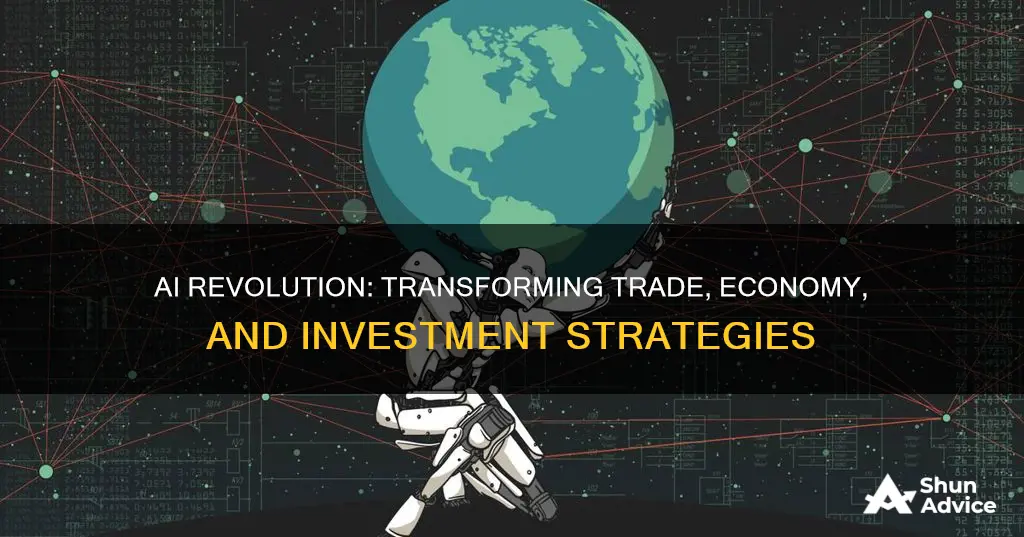
Artificial intelligence (AI) is set to have a transformative impact on the global economy, with the potential to contribute an additional $13 trillion to $15.7 trillion to the global economy by 2030. AI will affect almost 40% of jobs worldwide, replacing some and complementing others. The development and adoption of AI technologies will likely lead to higher productivity, innovation, and improved decision-making processes.
AI has the potential to drive significant economic growth, with China and North America expected to experience the greatest economic gains, accounting for about 70% of the global economic impact of AI by 2030. However, there are also challenges and risks associated with the widespread adoption of AI, including widening gaps between countries, ethical concerns, and the potential for job losses.
What You'll Learn

AI's impact on international trade
AI is set to have a transformative impact on international trade. AI applications in areas such as data analytics and translation services are already reducing barriers to trade. AI can improve predictions of future trends, such as changes in consumer demand, and better manage risk along the supply chain. For example, AI can be used to improve warehouse management, demand prediction, and the accuracy of just-in-time manufacturing and delivery.
AI is also being used to develop smart manufacturing, with sensors, IoT, and cyber-physical systems that connect machines, materials, supplies, and customers. This enables predictive capabilities, self-maintenance, and the ability to manufacture according to customer specifications.
AI-developed translation services are enabling small businesses to go global and increase exports. For instance, eBay's machine translation service led to a 17.5% increase in exports to Spanish-speaking Latin America.
AI can also be used to improve outcomes from international trade negotiations by analyzing economic trajectories of negotiating partners under different assumptions. Brazil has established an Intelligent Tech & Trade Initiative that includes using AI to improve trade negotiations.
Trade rules can support the development of AI by ensuring the free flow of data globally, protecting intellectual property, and addressing privacy concerns.
AI has the potential to contribute significantly to the global economy, with estimates ranging from $900 billion by 2026 to $15 trillion by 2030. AI can boost productivity, drive innovation, improve decision-making, and tackle complex problems across various fields.
However, there are also challenges and risks associated with AI. AI can disrupt the labor market, particularly for low-skill and blue-collar workers, and widen gaps between countries, companies, and workers. It is important for policymakers to address these challenges and ensure that the benefits of AI are shared broadly.
Dropshipping Investments: Funding the Future of E-commerce
You may want to see also

AI's effect on the global economy
AI is poised to transform the global economy, with the potential to contribute an additional $13 trillion to the global economy by 2030. This amounts to a 16% increase in cumulative GDP compared to today. AI will impact almost 40% of jobs worldwide, replacing some and complementing others.
The development and adoption of AI technologies will have both positive and negative effects on the global economy. On the one hand, AI has the potential to increase productivity, boost global growth, and raise incomes worldwide. It can improve efficiency, enhance decision-making, and tackle complex problems across various fields. AI can also drive innovation, create new industries, and improve products and services, leading to greater product variety and increased consumer demand.
However, there are also concerns that AI may replace jobs, deepen inequality, and disrupt existing industries. Advanced economies are more likely to experience the benefits of AI, while developing countries may face disruptions and a widening gap in economic gains compared to developed countries. Within countries, AI may affect income and wealth inequality, with workers who can harness AI seeing increases in productivity and wages, while those who cannot may fall behind.
To maximize the benefits of AI, policymakers must address the widening gaps among countries, companies, and workers. This includes establishing comprehensive social safety nets, offering retraining programs for vulnerable workers, and developing robust regulatory frameworks to ensure ethical development and responsible deployment of AI systems.
Overall, AI stands to have a transformative impact on the global economy, and careful policy decisions are needed to ensure that its benefits are shared by all.
Bankers: Bad Apples or Bad Barrel?
You may want to see also

AI's influence on investment and markets
AI is set to be a game-changer for the global economy, with the potential to transform the way people live and work. Its impact on investment and markets will be far-reaching and complex.
AI's Impact on Investment
AI is expected to contribute significantly to global economic activity, with an estimated $15.7 trillion added to the global economy by 2030. This contribution will come through increased productivity and consumption-side effects, with strategic investments in AI technology being a key driver.
The productivity of labour forces will be augmented by AI technologies, and certain tasks and roles will be automated. This automation will particularly affect repetitive, low-skilled jobs, with a shift in demand towards jobs requiring social and cognitive skills and more advanced digital capabilities.
AI will also drive greater product variety, personalisation, and affordability over time, stimulating consumer demand. This will result in product enhancements that will contribute an estimated 45% of total economic gains by 2030.
However, the adoption of AI could widen gaps between countries, companies, and workers, with developed countries and front-runner companies reaping greater economic benefits. Developing countries, particularly those with ageing populations, may be incentivised to adopt AI to boost slowing GDP growth and reduce labour costs, but they may lack the necessary infrastructure and skilled workforces to fully harness AI's potential.
AI's Impact on Markets
AI is expected to disrupt and transform various sectors and industries, including information technology, education, healthcare, aerospace, law, and pharmaceuticals.
In the information technology sector, software development, semiconductors, data centres, and cybersecurity will all benefit from AI advancements.
AI will also enable new capabilities in other sectors, such as drug screening and candidate identification in pharmaceuticals, legal document drafting and case summarisation in law, and enhanced monitoring and auto-correction in manufacturing.
Additionally, AI-powered diagnostics in healthcare will enhance the accuracy of systems and provide valuable insights for continuous improvement. Over time, this may lead to greater autonomy for AI systems in this field.
While AI has the potential to create new industries and careers, it may also disrupt existing professions and eliminate certain occupations. However, predictions of wholesale job losses may be overblown, as advancements also create new opportunities for skill development and career paths.
Challenges and Risks
The widespread use of AI, particularly with generative AI (GAI) systems, increases the risks of cyberattacks, fraud, and identity theft. Additionally, powerful AI systems pose new challenges in maintaining privacy and preventing the misuse of data about private individuals.
AI creators will need to address cultural biases that may inadvertently be incorporated into programs. Ensuring ethical development and responsible deployment of AI systems is crucial to mitigate potential risks and maintain public trust.
Regulatory Considerations
Policy and regulatory frameworks will play a vital role in governing the use of AI and addressing the challenges it presents. This includes establishing comprehensive social safety nets and retraining programs for workers affected by AI-driven changes in the labour market.
Additionally, maintaining intellectual property rights and protecting source code will be essential as AI continues to evolve and adapt existing content.
In conclusion, AI will have a profound influence on investment and markets, presenting numerous opportunities for economic growth and transformation while also introducing challenges and risks that need to be carefully navigated.
Lucrative Investment Opportunities: Exploring Avenues with 10 Percent Returns
You may want to see also

AI's role in job displacement
AI is expected to have a significant impact on the global labour market, affecting almost 40% of jobs worldwide. This impact will vary across different countries and economic sectors. Advanced economies are likely to be more affected by AI, with about 60% of jobs exposed to potential disruption. In these economies, AI may replace certain tasks currently performed by humans, leading to lower labour demand and potential job losses, particularly in low-skill blue-collar professions. However, it's important to note that AI is also expected to complement human work in many cases, enhancing productivity and creating new opportunities.
The transition to AI may also affect income and wealth inequality within and between countries. Workers who can harness the power of AI may see an increase in productivity and wages, while those who cannot may fall behind. Younger workers may find it easier to adapt to the changing landscape, while older workers could struggle to acquire new skills. This could lead to a widening gap in employment and wages, intensifying competition for skilled individuals who can develop and utilise AI tools effectively.
The impact of AI on net employment is predicted to be less severe than often feared. While there will likely be substantial pressure on full-time employment demand, the total net impact on jobs may be limited. In fact, investment in AI could lead to an increase in employment by about 5% by 2030, according to some estimates.
To address the potential negative consequences of AI on job displacement, policymakers must take proactive measures. This includes establishing comprehensive social safety nets and offering retraining programs for vulnerable workers. Additionally, countries should prioritise robust regulatory frameworks to ensure the safe and responsible development and deployment of AI.
Retirement Investment Rule: Navigating the Golden Years
You may want to see also

AI's potential to widen inequality
AI has the potential to be a game-changer for the economy and our lives. However, it is also important to consider its potential to widen inequality. AI is likely to affect almost 40% of jobs worldwide, replacing some jobs while complementing others. While AI has the potential to increase productivity and economic growth, it is also likely to increase inequality, both within and between countries.
Firstly, AI is expected to impact high-skilled jobs, which are more prevalent in advanced economies. In these economies, about 60% of jobs may be affected by AI. While some of these jobs will benefit from AI integration, enhancing productivity, others may be replaced by AI applications, leading to lower labor demand and wages. This could particularly affect older workers who may struggle to adapt to the new technology.
Secondly, AI may exacerbate income and wealth inequality within countries. Those who can harness AI may see an increase in productivity and wages, while those who cannot may fall behind. This could lead to a disproportionate increase in the labor income of higher-income workers, further exacerbating inequality. Additionally, gains in productivity from AI adoption will likely boost capital returns, which may also favor high earners.
Thirdly, AI may widen the wealth gap between countries, particularly between advanced and developing economies. Developing countries may face negative consequences for jobs as investment is diverted to advanced economies with more established automation. This could lead to a transitional decline in GDP in developing countries and make it more challenging for them to compete in the global economy.
Lastly, AI may reduce tax bases, weakening governments' capacity for redistribution and making it more difficult to address inequality. Overall, while AI offers many potential benefits, it is important to recognize its potential to widen inequality and take proactive measures to mitigate these risks. This may include establishing comprehensive social safety nets, investing in education and skills development, and implementing policies to reduce inequality.
The Ultimate Investment: Strategies for Maximum Returns
You may want to see also
Frequently asked questions
AI has the potential to significantly contribute to global economic activity, with estimates suggesting it could add $13 trillion to the global economy by 2030. AI will impact the nature of work, affecting almost 40% of jobs worldwide and transforming the way people live and work.
AI will impact trade by improving predictions of future trends, such as changes in consumer demand, and enhancing risk management along supply chains. It will also improve translation services, reducing barriers to trade.
AI can improve productivity, innovation, decision-making, and problem-solving across various fields, positively impacting society and the economy. It can also help identify the right candidates for drug trials, write legal documents, and improve warehouse management.
AI poses risks in terms of cyberattacks, fraud, and privacy. As AI systems become more advanced in adopting human language and creating images, the risk of identity theft increases. Additionally, there are concerns about maintaining intellectual property rights as AI adapts existing text and images.







